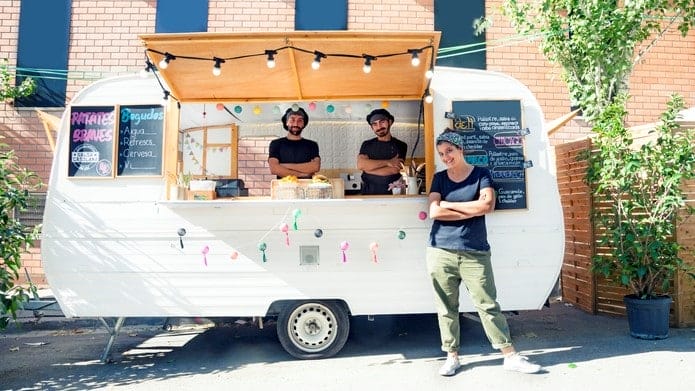Get your taste buds ready, because with the right licenses in hand, your food truck dreams can finally take a stand! If you’re planning on starting a food truck, you’ll need to acquire some food truck licenses and permits to legally operate your business.
The food truck licenses you need depend on your state and county governments. Even the names of the permits and licenses can vary by state, so it’s important to do some research to find out exactly what your local government requires.
We’ve made it easier by compiling a list of common business licenses and permits that you should know about when starting your food truck business! We’ve also ranked the level of effort you’ll need to put into getting each license on a scale of 1–10 (lowest effort to highest effort).
1. Business License
Level of Effort: 6/10
Cost: Varies depending on your state.
Maintenance: Must be renewed every 1–3 years.
Also known as a basic business license, a business license legally allows you to operate your food truck within a specific city or state. Acquiring a business license means the government recognizes your truck as a legitimate business and can track it for tax purposes.
In order to acquire a business license, you will need to determine your business structure, whether it be a partnership, sole proprietorship, or LLC. There is also a cost associated with acquiring a business license that varies by county and state. Additionally, you will occasionally need to renew your license as it will expire with time.
For more information about business licenses, visit your county or state website or check out the Small Business Administration website.
2. Employer Identification Number (EIN)
Level of Effort: 4/10
Cost: Free
Maintenance: None
An Employer Identification Number, or EIN, is a federal tax identification number that registers your business with the IRS. Some states provide your business with an EIN when you acquire your business license, but you may also have to acquire it separately.
Having an EIN allows your business to open a business bank account, create a credit profile, and hire employees. There is no cost associated with getting an EIN and you can apply for one online via the IRS website.
3. Driver's License
Level of Effort: 4/10
Cost: $33 (National Average)
Maintenance: Renew every 4–12 years.
As a mobile food vendor that operates out of a vehicle, you will be required to have a driver’s license to operate your food truck business. In many states, a standard-issued state driver’s license is sufficient to operate a food truck, but depending on state regulations—and the size and weight of your vehicle—you may also be required to have a commercial driver’s license.
The cost of getting a driver’s license varies by state but does not usually cost more than $100.
To apply for a standard or commercial driver’s license, and learn more about your state’s requirements for food trucks, contact your local Department of Motor Vehicles or DMV.

4. Health Department Permit
Level of Effort: 8/10
Cost: $100–$1,000
Maintenance: Renew every 3 years depending on your state.
Before you can prepare and serve your food, you will first need a health department permit or food service license. You can receive this permit by passing a health inspection from your local health department.
During the inspection, a health department agent will examine your truck to ensure it is in compliance with local health code regulations. They will also provide a grade for your truck as well as notes on how to improve your compliance with state health laws.
It is important to note that you will be required to pay for your food truck’s health inspection. The inspection price varies by state but can cost between $100–$1,000.
To schedule your inspection and learn more about your state’s specific health code regulations, you can visit your state or county’s health department website.
5. Food Handler’s Permit
Level of Effort: 4/10
Cost: $7–$15
Maintenance: Renew every 2–5 years.
Because your food truck will be preparing and serving food, you will also need a food handler’s permit. Depending on the state, you may also need to have this permit visible to the public at all times.
Food handler’s permits certify that you have been trained in proper sanitation and food safety practices. You can receive a food handler’s permit by attending a course, either in person or online, provided by the state. If you plan on hiring employees, they may also be required to attend the course, depending on the state.
Food handler’s permits typically last five years before they need to be renewed. The cost of attending the course varies by state but is usually less than $100. For more information on this permit, and to sign up for a food safety course, visit your state or county’s health department website.
6. Fire Certificate
Level of Effort: 7/10
Cost: Varies depending on your state.
Maintenance: Renew every 5 years depending on your state.
In many states, it’s not uncommon to require a fire inspection as well as a health inspection. During the inspection, a representative from the fire department will evaluate your food truck’s equipment, electrical wiring, and fire suppression system to ensure it is in compliance with proper fire safety protocols.
It is important to note that, depending on your state and food truck equipment, you may not be required to have a fire certificate, but you will want to check with your local government to be sure.

7. Parking Permit
Level of Effort: 4/10
Cost: Varies depending on your state.
Maintenance: Renewal depends on your state.
Depending on where you want to operate your food truck, you may be required to get a parking permit. This is because some streets in your city may be off-limits for food trucks. Other streets may have specific date and time restrictions—especially if your city already has a high number of food trucks and needs to avoid traffic congestion in certain areas.
You can get a parking permit by contacting your county clerk. They may also be able to help you map an effective area of operation according to street restrictions and availability within the city.
8. Special Event Permit
Level of Effort: 3/10
Cost: Varies depending on your state.
Maintenance: Renewal depends on your state.
If you plan on working at a special event, whether it be a food truck rally, a local festival, or a wedding, you may be required—either by the state, the venue, or the event organizer—to have a special event permit.
Special event permits are temporary permits that allow you to operate your business at a specific location for a short period of time.
Not all states or venues require special event permits, so if you plan on attending an event, make sure to check with the event organizer to know which permits you will need.
9. Seller's Permit
Level of Effort: 3/10
Cost: $0–$100 depending on your state. (TaxHero)
Maintenance: Renewal depends on your state.
If you plan to purchase ingredients and supplies wholesale to prepare your meals, you may need to look into getting a seller’s permit.
A seller’s permit will allow you to purchase goods at wholesale prices without paying sales tax. It also allows you to charge sales tax when a customer purchases your food.
Not all states require seller’s permits, so you will need to check with your state government when preparing your food truck business.

10. Commissary Letter of Agreement
Level of Effort: 5/10
Cost: No cost
Maintenance: None.
In some states, food trucks are not permitted to prepare their food in the vehicle. In these cases, you may need to prepare your food in a commercial kitchen or commissary.
Commercial kitchens and commissaries are rented spaces that provide cooking areas, food storage, and other necessary food prep supplies for food business owners. Once you have a commercial kitchen or commissary, you will need to provide the state or county with a signed letter of agreement or contract as proof that you are using the facility to prepare food.
Luckily, finding a commercial kitchen or commissary is easier than ever with companies like The Kitchen Door, which allow you to search for a commercial kitchen by city or zip code.
You can contact your local county or state government to find out if you need to provide a commissary letter of agreement.
Protect Your Food Truck With FLIP Insurance
Level of Effort: 1/10
Cost: $25.92 per month
Maintenance: Turn on EZ Renew for an automatic renewal each year!
Food truck licenses and permits aren’t the only things you need when building your food truck business. You also need high-quality food truck liability insurance to protect your business from the cost of claims in case an accident involving your business occurs.
If you haven’t yet looked at liability insurance, we encourage you to check out FLIP’s food truck insurance plan. It provides comprehensive coverage to protect your truck from risk and does it in ten minutes or less via our quote-free, online process.
When it comes to protecting your business, don’t leave your food truck out to dry. Get the coverage you need with FLIP!
We understand that it can be a bit overwhelming when it comes to all of the permits, but it is so worth it. When your business is up and running you can finally make your dreams come true! So what are you waiting for? Get started today!


